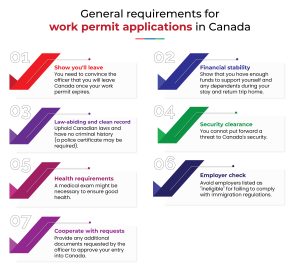Do you have any plans to work in Canada?
Getting a job in Canada is indeed a thrilling catch! Right?
Canada is a beautiful country with a growing economy and a welcoming atmosphere. However, to work legally in Canada, you’ll need a work permit. This blog will guide you through the process of applying for a Canada work permit, providing valuable tips to increase your chances of success. And these Canada Work Permit Tips will definitely gonna change your life. So stick around till the end of the blog, it’s worth it!
🍁Understanding the Importance of a Work Permit
A work permit is a document issued by the Canadian government that authorizes a foreign national to work in Canada for a specific employer and occupation. It’s essential to have a work permit before you start working in Canada.
There are two primary kinds of work permits:
➾ Employer-specific work permits: These permits are tied to a specific employer and occupation. To obtain this type of permit, you’ll typically need a job offer from a Canadian employer who has obtained a positive Labour Market Impact Assessment (LMIA).
➾ Open work permits: These permits allow you to work for any employer in Canada, except for those listed on the Immigration, Refugees and Citizenship Canada (IRCC) ineligibility list.
Remember, regardless of the type of work permit you apply for, working without a valid work permit is illegal.
🍁Simplifying the Work Visa Application Process
The Canadian work visa process can seem horrifying at first. However, by following these steps, you can well organize the application process:
➾ Determine your eligibility: The first step is to determine if you’re eligible to apply for a work permit. There are various work permit programs available, each with its own eligibility requirements. You can find a full list of programs on the Immigration, Refugees and Citizenship Canada (IRCC) website:.
➾ Choose the right program: Once you’ve established your eligibility, you’ll need to choose the work permit program that best suits your situation. Some popular programs include the Temporary Foreign Worker Program (TFWP), the International Mobility Program (IMP), and the Post-Graduation Work Permit (PGWP).
➾ Gather the required documents: Each work permit program has a specific set of required documents. You can find a document checklist for your chosen program on the IRCC website.
➾ Submit your application: Once you’ve gathered all the required documents, you can submit your application online.
➾ Wait for processing: Processing times for work permit applications can vary depending on the program and your individual circumstances.
🍁Researching the Job Market in Canada
Before applying for a work permit, it’s crucial to research the job market in Canada. This will help you identify in-demand occupations, understand average salaries, and tailor your resume and cover letter to the Canadian market.
Here are some tips for conducting your job market research:
➾ Job boards: Search for jobs on popular Canadian job boards like Indeed, Glassdoor, and Workopolis.
➾ Government websites: The Government of Canada website provides information on labor market trends and job outlooks.
➾ Industry associations: Many industry associations have job boards and resources for newcomers to Canada.
➾ Research average salaries: Understanding average salaries will help you negotiate a fair wage with potential employers.
➾ Network with professionals: Connect with professionals in your field already working in Canada. They can provide valuable insights and advice.
🍁Eligibility requirements for work permit
There are some specific requirements you need to meet, depending on when you apply for your work permit.
🍁Choosing the Right Work Permit Program
With multiple work permit programs to choose from, selecting the most suitable one can be challenging. Factors such as duration of stay, employment conditions, and eligibility criteria should all be considered when making your decision. Whether you’re a recent graduate or a skilled professional, there’s a work permit program tailored to your needs.
There are various work permit programs available for foreign nationals who want to work in Canada. Here’s a brief overview of some of the most popular programs:
➾ Temporary Foreign Worker Program (TFWP): This program is a major pathway for obtaining an employer-specific work permit in Canada. It’s designed to address labor shortages by allowing Canadian employers to hire foreign workers for temporary positions.
➾ International Mobility Program (IMP): This program offers work permits through various streams, often without requiring an LMIA. These streams can include working holidays, reciprocal youth exchanges, and intra company transfer. The IMP is a good option for those seeking more open work permit categories.
➾ Post-Graduation Work Permit (PGWP): This program allows international students who have graduated from a designated learning institution (DLI) in Canada to gain valuable Canadian work experience. The PGWP is an open work permit, allowing graduates to work for any employer in Canada. It’s important to note that not all DLIs and programs qualify for the PGWP. Make sure that you research the eligibility of your chosen program before applying.
🍁Preparing Your Work Permit Application
Obtaining the necessary documents is an important step in the work permit application process. Here’s a general checklist to get you started (be sure to consult the IRCC website for your specific program requirements):
➾ Completed work permit application form
➾ Valid passport
➾ Proof of work experience and qualifications (e.g., degrees, diplomas, certificates)
➾ LMIA (if required by your chosen program)
➾ Job offer letter (if required by your chosen program)
➾ Proof of funds to sustain yourself throughout your stay in Canada.
➾ Medical examination results (if required)
🍁Overcoming Challenges in a New Country
Moving to a new country presents its own set of challenges, from cultural adjustments to unfamiliar work environments. However, with resilience, adaptability, and a positive mindset, you can overcome these challenges and thrive in your new Canadian home.
Here are some tips for overcoming some of the common challenges faced by newcomers to Canada:
➾ Culture shock: Culture shock is a natural reaction to living in a new environment. Be patient with yourself and allow time to adjust.
➾ Finding housing: Finding affordable housing can be challenging in some Canadian cities. Research different neighborhoods and consider renting before buying.
➾ Embrace Diversity: Canada is a multicultural nation. Accept the opportunity to learn about different cultures and make new friends from diverse backgrounds.
➾ Learn about Canadian Culture: Familiarize yourself with Canadian customs and traditions to help you integrate smoothly.
➾ Build a Support Network: Connect with other newcomers and the local community to build a support system.
🍁Choose CanApprove to Assist You
Obtaining a Canadian work permit opens the door to fulfilling your Canadian dream, whether it’s contributing to a dynamic job market, exploring breathtaking landscapes, or experiencing a multicultural society. Remember, this blog post serves as a general guide, and the specific requirements and procedures can vary depending on your individual circumstances.
In the journey of immigration, having the right guidance and support can make all the difference. That’s where CanApprove comes in. With over 25 years of expertise, personalized approach, and dedication to client success, choosing CanApprove means choosing a partner who will navigate the complexities of the immigration process with you every step of the way.
From initial consultations to final approvals, CanApprove offers peace of mind, assurance, and the highest level of professional service.
➾ So why choose CanApprove? Because when it comes to achieving your dream of living and working in Canada, having the right team in your corner can make all the difference.


